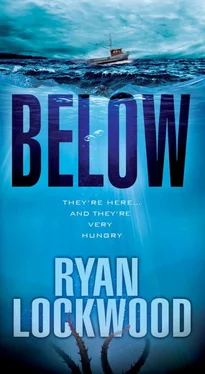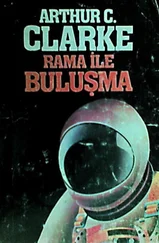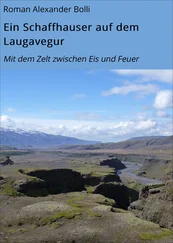“Sound?”
“Right. Sonar. Just like a submarine, or a whale or dolphin. I’ve been trying to include sounds as well as lights when I dive with Humboldts in Baja, and I’ve recently discovered that they appear to react to some sounds—particularly very long-wave, deep sounds that travel a long way underwater.”
“So you’re saying squid can hear?”
“I’m not sure if I’d call it hearing, but yes, they can process sound with organs in their bodies. My concern is that in addition to visual cues like lights, this shoal could now be associating certain sounds with food.”
“You mean people splashing around on the surface?”
She nodded. “Perhaps. And maybe even the sound of boat motors.”
Sturman took his hat off and rubbed the rough stubble on his head. “Christ. What are you saying, Doc? Boaters are ringing dinner bells when they start their motors?”
“I think the best thing we can do for now is simply try to keep track of this shoal and where it’s headed. That way we can try to update law enforcement. And we need to keep the public informed.”
Sturman leaned forward. “In the meantime, we shouldn’t just be tracking them. We need to talk about how we can eliminate the threat.”
“You’re still hung up on that?” Val shook her head. “It’s a ridiculous idea, and it won’t work.”
“Well, it’s better than doing nothing.”
“We aren’t doing nothing. We’ll try to keep tabs on the shoal’s location, so we can alert local authorities of a possible threat.”
Sturman snorted. “Okay, so we follow your eco-friendly advice and just try to find them. We still heading out at night, then?”
“I don’t think there’s any need for that at the moment. And it’s probably safer going out in the daytime. Joe, we may end up staying out for a week or more, possibly migrating along the coast with the shoal. Assuming Sturman is okay with that.”
“Fine by me.”
“As we go, we can relay our information back to Joe. And we need to keep in mind that other shoals in the area could also be afflicted with these parasites.”
Joe leaned forward and rested his elbows on the table, his face lit by the flicker of the candlelight. “So now you think there’s more than one dangerous group of these squid? How many individuals are in each shoal?”
“Each shoal is usually made up of hundreds, or even thousands, of individuals. But I have no idea if there’s more than one dangerous shoal. Just that there are multiple shoals in the area.”
“Shit. Sounds like the start of some biblical plague.”
“Don’t be so dramatic, Joe. They’re just doing what nature built them to do. And also perhaps what this parasite is making them do. I have to admit, I’ve never seen this body size or level of aggression in a shoal of Humboldt squid.”
Joe felt his face get hot. “I don’t know, Val. You may see these animals as some natural part of the environment, but I just see them as a threat. And whatever’s going on here, it doesn’t seem natural to me.” Joe touched the cross around his neck. “I’ve seen some pretty horrible things in my life, being a cop, but when I try to picture what these people were thinking in their last moments… If these squid aren’t evil, then I don’t know what is.”
Sturman tipped his hat. “Amen, brother.”
“Well, guys, ask yourself this: why are these squid even here, off California? They weren’t here even a decade ago.”
“I don’t know,” Joe said. “You said it’s because of lack of competition from larger fish, a changing environment, that sort of thing.”
“And who’s responsible for that?”
Joe snorted. “You think this is our fault, Val? That’s a stretch.”
“Is it?”
The table went silent. Joe calmed himself by listening to the heavy traffic driving by on the street behind the restaurant as he watched a busboy clean empty bottles and dirty dishes off a vacant table.
Sturman said, “Well, kids, we can agree on one thing. How this happened isn’t the most important thing right now, is it?”
“I guess it isn’t,” Val said.
Joe grunted. “No. But we’ll need to employ an old cop tactic to figure out what the hell is going on.”
Val looked at him warily. “Which is…?”
“Time to bring them in for questioning.”
Although the threat was obscured by darkness, they knew it was there.
Through the dense seawater, even their sensitive eyes could detect almost nothing but absolute blackness. It was too deep. All the sunlight had been fully absorbed in the layers of water above them. But they could sense the silent, hulking figure nearby, perhaps through smell, perhaps through the vibrations that emanated off its surface through the water. The size and shape they perceived indicated a known threat, based on instincts bred deep into their being. But there was something wrong with this creature.
Hovering in the deep a short distance from the enormous animal, the shoal’s fear was gradually replaced by curiosity. A detachment of large squid maneuvered away from the others to approach the leviathan, which rested, unmoving, on the fine, smooth sediments of the level ocean floor. While the great creature’s rows of conical teeth may once have been a threat, they were no longer. The many tons of flesh cloaking the jaws and impressive body had begun to decay, and white ribs rose gleaming from the beast’s sides, serving as visible beacons in the black water as the squid neared.
As the one-eyed female drew closer, she detected movement on the whale carcass. A group of squirming, wormlike beasts twisted and bored their limbless bodies into the flesh as they fed. Some of the more zealous eagerly wriggled themselves through the rotting flesh and vanished into the body of the dead whale. Though they were small enough to be prey, she kept her distance from the unfamiliar creatures. Her natural fear of the great whale, regardless of its death, was enough to prevent her from approaching any closer.
The shoal had thrived in recent weeks. Drifting along a steady current in the broad undersea channel, they had risen each night to take advantage of the abundance of sea life gathered there to utilize the free flow of nutrients. Despite these successful hunting efforts, however, the shoal was beginning to behave erratically.
Although she was not capable of assessing her own actions, the one-eyed female felt a dim confusion. At the moment, hovering above the bottom of the ocean near the whale fall, she and the other squid began a slow progression back toward shallower waters. Though the shoal thrived in deep water, they had no reason to be this far down, this close to the ocean floor, and would not find food here.
She eyed her scarred sister, who moved alongside her, and her tentacles twitched impulsively outward. She retracted them. Her sister was nearly as large as herself, and posed too much of a threat.
The members of the shoal normally sought out smaller, weaker individuals of their own kind when food was scarce, but recently they had attacked one another seemingly without reason. Many of the smallest members of the enormous group had already been eaten or mortally wounded in the past few weeks. Cannibalism was becoming impossible.
The shoal was beginning to lose its natural rhythms and drives, replaced by an ever-increasing state of unfocused aggression that pervaded its collective being.
And beneath its members’ streamlined exteriors, clusters of tiny worms, much smaller than those on the whale carcass, coiled and looped their segments around swollen organs, disrupting the normal functions of each squid as they too fed.
Читать дальше












